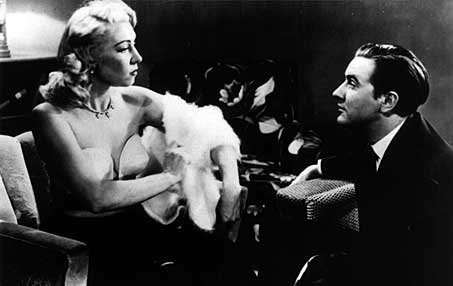|
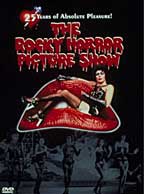
The
Rocky Horror Picture Show
Fox
Video, 1975
Director:
Jim Sharman
Screenplay::
Jim Sharman and Richard O'Brien
Starring:
Tim Curry, Barry Bostwick, Susan Sarandon, Richard O'Brien, Patricia Quinn,
Little Nell, Meatloaf
Rated R, 83 minutes
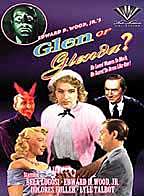
Glen
or Glenda
1953
Director/Screenplay:
Ed Wood
Starring:
Bela Lugosi, Ed Wood, Dolores Fuller
|
Notes
on Camp
by
Michael D. Klemm
Reprinted
from Outcome, December,
2000
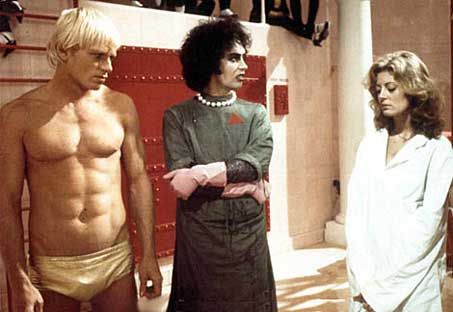
.Before the offbeat
plays of Charles Busch (Vampire Lesbians
of Sodom, Psycho Beach Party) and Christopher Durang (Sister Mary
Ignatius Explains It All For You) there was the grand-daddy of them
all: The Rocky Horror Picture Show.
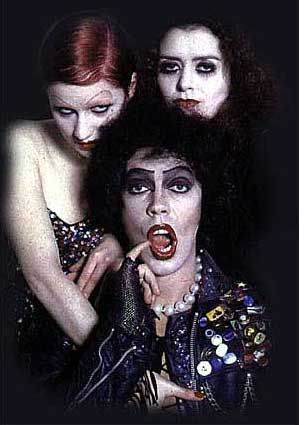 This
film still remains the epitome of high camp. To this day, audiences bitten
with the performing bug continue to attend midnight shows dressed in fishnet
stockings as their favorite characters so that they can interact with
their heroes onscreen. It's even being revived on Broadway with lesbian
actress/comedienne Lea
Delaria cross-dressing in the twin roles of Eddie and Dr. Scott. With
its 25th Anniversary re-release on video and DVD, (a virtual cornucopia
of extras on the DVD will be discussed later), Rocky
still fascinates. A close examination or what lies beneath the veneer
of camp however reveals a clever satire on society and outmoded concepts
of morality. This
film still remains the epitome of high camp. To this day, audiences bitten
with the performing bug continue to attend midnight shows dressed in fishnet
stockings as their favorite characters so that they can interact with
their heroes onscreen. It's even being revived on Broadway with lesbian
actress/comedienne Lea
Delaria cross-dressing in the twin roles of Eddie and Dr. Scott. With
its 25th Anniversary re-release on video and DVD, (a virtual cornucopia
of extras on the DVD will be discussed later), Rocky
still fascinates. A close examination or what lies beneath the veneer
of camp however reveals a clever satire on society and outmoded concepts
of morality.
Rocky's
bizarre plot is well known. Two all-American innocents
named Brad and Janet seek refuge in a spooky old mansion when their car
breaks down. Instead of finding Boris Karloff and Bela Lugosi in monster
make-up, they meet transvestites from Transylvania who dance the Time
Warp. The old screen monster becomes a sexual predator, albeit a sensual
one, who sings torch songs and whose creed is "give yourself over
to absolute pleasure." The Mad Scientist's creation is a hunky blonde
muscleman in gold lame boxer shorts. This truly subversive musical spoofs
dozens of sci-fi and horror films (especially James
Whale's 1932 camp classic, The Old
Dark House, and of course his 1931 Frankenstein)
and melds them with the 1950s rock and roll movie genre.
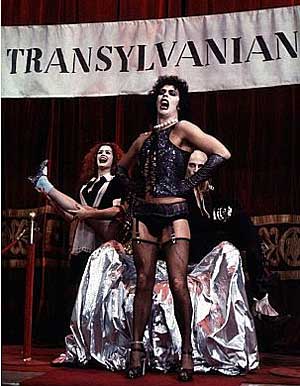 In
the 50s, parents thought rock and roll was evil and would corrupt their
children. Rocky Horror takes
that notion to the limit as Brad and Janet lose their innocence at the
hands of crossdressing aliens. The lurid mansion is ripe with "perverse"
sexuality... incest and lesbianism is hinted at among the servants...
and the evil Dr. Frank-N-Furter deflowers both Janet and Brad.
As Janet says, when they enter the house, "There's something unhealthy
here!" In the end the Translvanians turn out to be just as prudish
about sex as their earthbound counterpoints when Riff Raff and Magenta
return, dressed in silver underwear, and inform Frank-N-Furter that his
"lifestyle's too extreme." A puritanical scientist concurs with
their judgment and insists that "society must be protected." In
the 50s, parents thought rock and roll was evil and would corrupt their
children. Rocky Horror takes
that notion to the limit as Brad and Janet lose their innocence at the
hands of crossdressing aliens. The lurid mansion is ripe with "perverse"
sexuality... incest and lesbianism is hinted at among the servants...
and the evil Dr. Frank-N-Furter deflowers both Janet and Brad.
As Janet says, when they enter the house, "There's something unhealthy
here!" In the end the Translvanians turn out to be just as prudish
about sex as their earthbound counterpoints when Riff Raff and Magenta
return, dressed in silver underwear, and inform Frank-N-Furter that his
"lifestyle's too extreme." A puritanical scientist concurs with
their judgment and insists that "society must be protected."
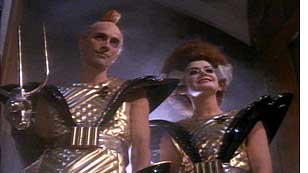 But
Rocky is anything but
a stuffy satire and some might say I am reading too much into this goofy
movie. But these underlying themes are there for all to see, disguised
as outrageous entertainment. During the 70s, artists like David
Bowie were redefining gender roles, and Rocky
takes these experiments to their logical conclusion. The film flopped
on its first release but a few years later it gained notoriety on the
midnight show circuit as audiences turned it into a complex piece of performance
art. Many who were confused about their sexuality would find solace with
an audience who was being told "Don't Dream it. Be it." But
Rocky is anything but
a stuffy satire and some might say I am reading too much into this goofy
movie. But these underlying themes are there for all to see, disguised
as outrageous entertainment. During the 70s, artists like David
Bowie were redefining gender roles, and Rocky
takes these experiments to their logical conclusion. The film flopped
on its first release but a few years later it gained notoriety on the
midnight show circuit as audiences turned it into a complex piece of performance
art. Many who were confused about their sexuality would find solace with
an audience who was being told "Don't Dream it. Be it."
25 years later, Rocky
still endures because of its clever premise, its catchy songs and its
dynamic casting. Tim Curry, who originated the role on the London stage,
is divinely decadent as Dr. Frank-N-Furter. Barry Bostwick and Susan
Sarandon are terrific as the young innocents, while Meatloaf almost
steals the show as Eddie during his one scene as a rock and roll hooligan
who once shared Frank's bed.
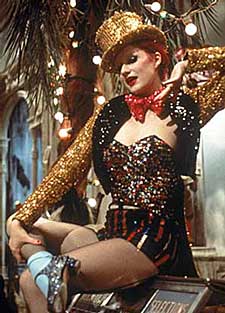 DVD
collectors will be happy to know that Rocky
has just made its DVD debut with a two-disc set that is
loaded with extras. Disc 1 features pristine widescreen stereo transfers
of both the American and British versions. (This reviewer prefers the
British rendering because the deletion of the song "Super Heroes"
from the American cut destroys the pace of the ending). Extras include
a running commentary with writer Richard OŐBrien (Riff Raff) and Patricia
Quinn (Magenta) as they reminisce about both the stage and screen versions. DVD
collectors will be happy to know that Rocky
has just made its DVD debut with a two-disc set that is
loaded with extras. Disc 1 features pristine widescreen stereo transfers
of both the American and British versions. (This reviewer prefers the
British rendering because the deletion of the song "Super Heroes"
from the American cut destroys the pace of the ending). Extras include
a running commentary with writer Richard OŐBrien (Riff Raff) and Patricia
Quinn (Magenta) as they reminisce about both the stage and screen versions.
Also included are
"easter eggs" which will take a viewer to clips of audience
participation in a movie theater, as well as prompting when to throw rice
and toilet paper at your television screen. A third audio track attempts
to re-create the theatrical experience (with limited success) by having
an actual audience yell their own lines of dialogue to augment the film.
The second disc includes a VH-1 documentary as well as videos, trailers,
and interviews with most of the castmembers. Tim Curry is strangely absent
from most of these proceedings and that is my only quibble with the discs.
This will make a great stocking stuffer for any Rocky
fans on your Christmas list.
|
|
Rocky
Horror was deliberate camp. There is also, of
course, camp that is unintentional. A good example of this is Glen
or Glenda, (1953), one of my favorite bad movies of all
time. This celluloid catastrophe, the creation of the sublimely untalented
Ed Wood, is in a class by itself. Writer/director
Ed Wood is both the "auteur" of the notorious Plan 9 From
Outer Space and the subject of a quirky, but brilliant, biopic by
Tim Burton. He has been revered for years
as the worst director of all time.
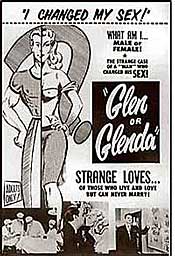 Glen
or Glenda, aka I Changed My Sex, was Wood's first
feature film. It was produced by a low budget studio which specialized
in exploitation movies, and its aim was to cash in on the recent Christine
Jorgenson sex change scandal. Completely ignoring the producers' intentions,
Wood wrote a script that attempted to deal sympathetically with the problems
faced every day by crossdressers. Wood, himself, liked to wear women's
clothes and was especially fond of white angora sweaters. His attempt
to make an avant-garde autobiographical film is a hoot which has to be
seen to be believed. Glen
or Glenda, aka I Changed My Sex, was Wood's first
feature film. It was produced by a low budget studio which specialized
in exploitation movies, and its aim was to cash in on the recent Christine
Jorgenson sex change scandal. Completely ignoring the producers' intentions,
Wood wrote a script that attempted to deal sympathetically with the problems
faced every day by crossdressers. Wood, himself, liked to wear women's
clothes and was especially fond of white angora sweaters. His attempt
to make an avant-garde autobiographical film is a hoot which has to be
seen to be believed.
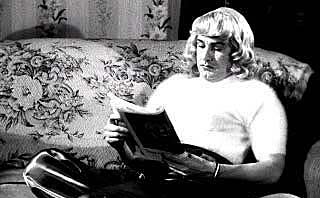 Wood
stars (under a pseudonym) as Glen, a sad and pathetic man who likes to
wear dresses as his alter ego, Glenda. While engaged to be married, he
is afraid to confess the truth to his fiancee. Meanwhile, he strolls the
streets in drag, with visible five-o'clock shadow and hairy forearms,
and gazes longingly at women's lingerie in store windows. He finally beaks
the news to his fiancee and, as the violins swell, she removes her angora
sweater and hands it to the rapturous Glen. Wood
stars (under a pseudonym) as Glen, a sad and pathetic man who likes to
wear dresses as his alter ego, Glenda. While engaged to be married, he
is afraid to confess the truth to his fiancee. Meanwhile, he strolls the
streets in drag, with visible five-o'clock shadow and hairy forearms,
and gazes longingly at women's lingerie in store windows. He finally beaks
the news to his fiancee and, as the violins swell, she removes her angora
sweater and hands it to the rapturous Glen.
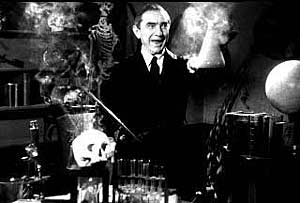 What
propels Glen or Glenda to soaring
heights of lunacy is the film's narrator... who is none other than Bela
Lugosi as an omnipotent puppetmaster who oversees Glen's sad story.
Sitting in an armchair surrounded by skeletons and shrunken heads, Lugosi
spouts such ludicrous soliloquies as
"Bevare. Bevare of the big green dragon who sits on your doorstep.
He eats little boys, puppy dog tails, big fat snails. Bevare. Bevare."
Adding to this overall air of incoherence are subliminal shots of atomic
bombs and buffalo stampedes at key moments. What
propels Glen or Glenda to soaring
heights of lunacy is the film's narrator... who is none other than Bela
Lugosi as an omnipotent puppetmaster who oversees Glen's sad story.
Sitting in an armchair surrounded by skeletons and shrunken heads, Lugosi
spouts such ludicrous soliloquies as
"Bevare. Bevare of the big green dragon who sits on your doorstep.
He eats little boys, puppy dog tails, big fat snails. Bevare. Bevare."
Adding to this overall air of incoherence are subliminal shots of atomic
bombs and buffalo stampedes at key moments.
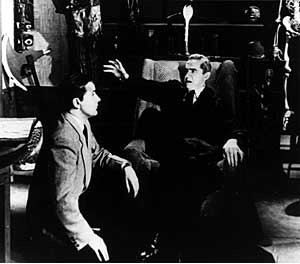 Glen
or Glenda
also features a police psychologist that is played by a man who must have
graduated from the Dragnet school of acting. His clinical observations
about transvestites are about as accurate as a typical Dr. Laura Schlessinger
show. A sex change operation is suggested by some surgical stock footage,
providing the only remaining link to the producer's original plans before
Wood put his stamp on the film. Glen
or Glenda
also features a police psychologist that is played by a man who must have
graduated from the Dragnet school of acting. His clinical observations
about transvestites are about as accurate as a typical Dr. Laura Schlessinger
show. A sex change operation is suggested by some surgical stock footage,
providing the only remaining link to the producer's original plans before
Wood put his stamp on the film.
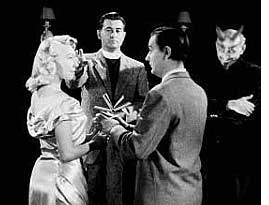 One
of the many highlights is a dream sequence featuring a horde of transvestites
who chase Glen after he and his fiancee are married while a ludicrous
devil looks on, grinning. Meanwhile Lugosi watches impassively while a
chorus of children chant "Puppy dog tails! Big fat snails!"
repeatedly on the soundtrack. The sequence ends with Glen rapturously
dressed again as Glenda. One
of the many highlights is a dream sequence featuring a horde of transvestites
who chase Glen after he and his fiancee are married while a ludicrous
devil looks on, grinning. Meanwhile Lugosi watches impassively while a
chorus of children chant "Puppy dog tails! Big fat snails!"
repeatedly on the soundtrack. The sequence ends with Glen rapturously
dressed again as Glenda.
Make no mistake
here. Glen or Glenda is one
of the worst movies in the history of cinema. Its humor might be unintentional
but it's actually much funnier than most of Hollywood's real comedies.
It is redeemed somewhat by Wood's good intentions but, as Burton's film
Ed Wood faithfully records, the director
was no Orson Welles. All we can say is... he tried. And it's a pity because
had Wood possessed any actual talent, this might have been a groundbreaking
queer film.
[Reviewer's note,
2007: I might be getting sentimental in my old age, but I want to cut
Ed Wood some slack. Yes, his films are still terrible, but calling him
the worst director of all time is unfair. A close examination of Glen
or Glenda, (when you stop laughing), reveals a cornucopia of ideas...
it's just that Wood didnŐt have the artistic ability to realize them.
Glenda is never (intentionally) played for laughs and this was quite radical
for the 1950s. Some of the stock footage that he pads out the length
of the film with seems to have been chosen with a purpose - for example,
long phallic streams of molten steel in a factory are seen being cut by
machinery during a narrative voice-over about sex roles. Because the film
deals with deconstructed gender, I suppose that the green dragon eating
the puppy dog tails soliloquy does make sense in an odd sort of
way. But can anyone explain that buffalo stampede?]
More On Ed Wood
Tim Burton's Ed Wood
More On Susan
Sarandon
The Hunger
|


